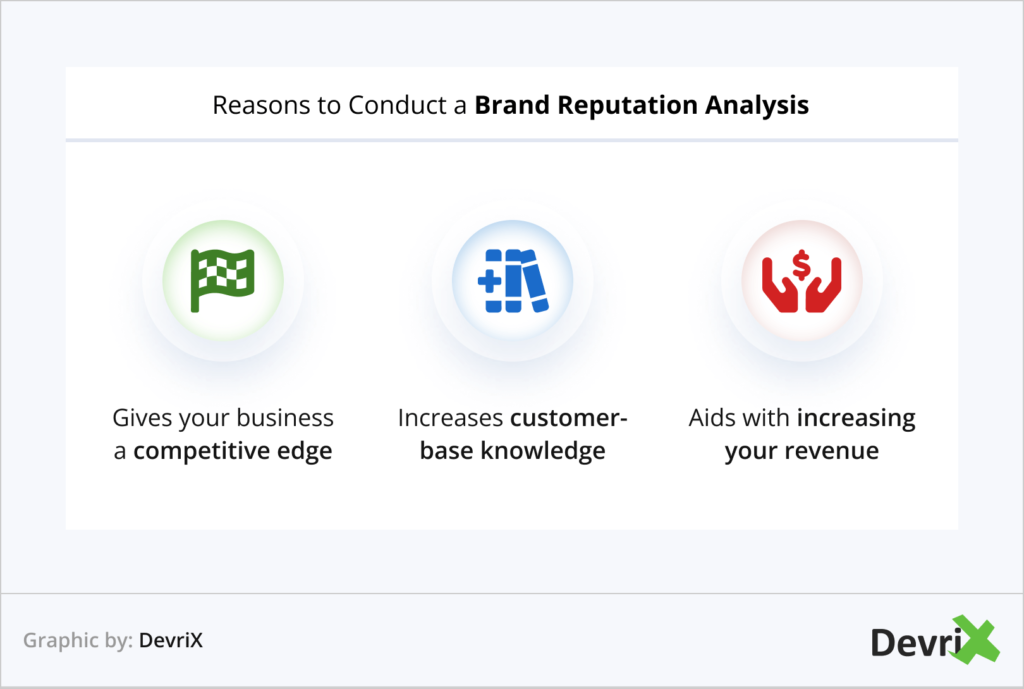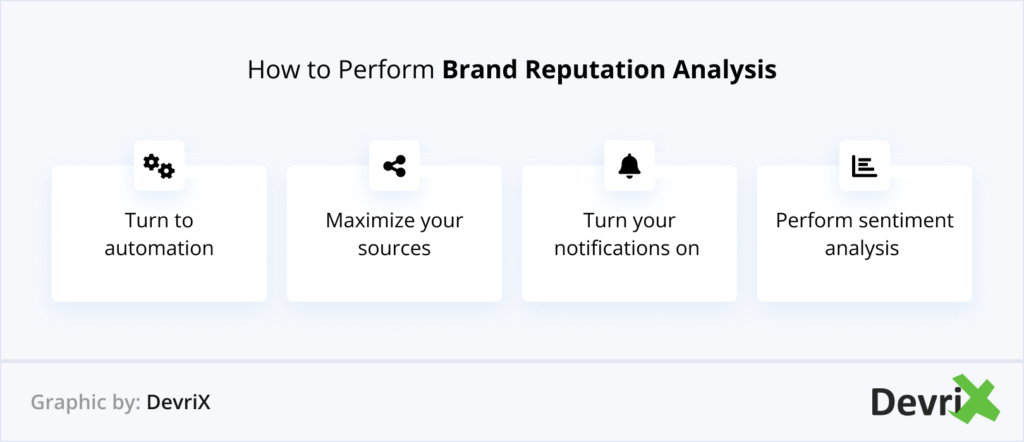Your brand reputation directly affects the way your customers interact with your business. If they see your company as well-established and trusted, then chances are they will keep on supporting it and maybe even recommend it to their friends and family. However, if your brand reputation ranking is low, then you will definitely see a decline in your revenue.

According to a study done by Semrush, over 90% of people are likely to trust a brand that’s been recommended to them. Oberlo also reports that 54.7% of consumers read about four reviews before they decide on buying an item. With this being said, it’s no secret that customers tend to analyze the brand reputation before pushing through with their purchase.
Why Do You Need to Conduct a Brand Reputation Analysis?
Most companies tend to analyze the basic data including their lead conversion rates, web traffic, revenue, and retention rate. However, assessing your brand reputation is just as important as measuring these metrics. It’s a must to pay attention even to the smallest things if you8 want to further grow your business.
Listed below are a couple of reasons why you should conduct a brand reputation management and analysis.
It Gives Your Business a Competitive Edge
Being socially aware of how the general public feels about your brand will help you outrun your competition. The market is massive, and you’d want to stand out for people to start noticing your brand. A lot of consumers today are socially conscious of the purchases that they are making, and being aware of this will give you an edge above the rest.
Increased Customer-Base Knowledge
By conducting a brand reputation analysis, you can increase your knowledge about your customer base. This helps you determine what your consumers are looking for, what they want to see from your business, and what pain points they are experiencing.
Additionally, you can also recognize what works for your brand and what doesn’t. Once you’ve got the data on your hand, you can then start adjusting your marketing strategy accordingly.
It Aids With Increasing Your Revenue
If you know what works and what doesn’t, you can immediately turn things around and change your strategy for the better. The more you learn about your data, the better you can serve your customers. This leads to a domino effect, and if you have higher lead conversion rates and word-of-mouth recommendations, then there is a high chance that your revenue will increase.

How to Do Brand Reputation Analysis
Now that you know the advantages of conducting a brand reputation analysis, it’s time to dive into how you can start examining how your customers perceive your business.
Turn to Automation
Brand reputation management and analysis can be time-consuming. Thankfully, it can be done through an automation tool such as this one. By using an automated system, you can schedule the inspection whenever you want. The tool will collate all of the crucial data and numbers and give you a detailed report on where your business stands. This way, you can save your precious time focusing on more important tasks.
Maximize Your Sources
Don’t limit yourself to just one channel when doing your brand reputation management and analysis. Check all of your resources including all of your social media pages, forums, blog site, and even other websites where you have published your content. Pay attention to the comments and what your customers are saying to get a good feel of where the brand stands.
It’s crucial to address both negative and positive comments that you see about your company. Take the time to write back and have your customer service or marketing team reach out to these people. The more they see that you are dedicated to giving them the best service, the more they will learn to appreciate your brand.
Be active in the community and implement social listening. Doing this will help you identify potential growth opportunities based on what you see online.
Turn Your Notifications On
We’ve mentioned automation, and this is one of the tool’s many benefits. Be looped in on what’s happening around your brand by turning on real-time notifications. Moreover, taking advantage of this feature will help you take advantage of user-generated content. Tweets, Facebook posts, and Instagram mentions should be reposted in real-time so other consumers can see the positive things that people are saying about your brand.
Perform Sentiment Analysis
Keeping track of the numbers is important, but seeing how the people are reacting to your brand is just as crucial. People might be talking about your brand online, and it pays to get a view of how they are reacting to it.
Make it a habit to regularly check your reviews and testimonials on all platforms. Carefully analyze each one and literally read between the lines. See the tone of voice the consumers are using and start a conversation with them. Apologize if needed, and thank them for their patronage if they are expressing gratitude.

What Tools Can I Use for Brand Reputation Analysis?
Thankfully, there are a couple of tools that you can take advantage of when doing your brand reputation analysis. See the ones that we have listed below and bookmark them for future reference.

Google Alert
The tool is completely free to use, so there is no reason not to implement it in your routine. It’s also user-friendly, as you only need to input the keyword/s that you want to track. Google Alert will then send an email to your preferred email address whenever the keyword is mentioned online. However, you have to take note that this doesn’t include social media mentions.
Determ
Determ prides itself in monitoring your brand mentions 24/7. Aside from this, the tool also gives you a detailed report of the data that they collate. They can track your mentions on all social media platforms, as well as on other websites, blogs, and forums.
Awario
Awario is similar to Determ in a way that it alerts the user whenever the brand is mentioned on almost all platforms. It helps you track your mentions so you can join the conversations in real-time. The tool is also free to use, but you can choose to upgrade if you want to take advantage of its premium benefits.
Conclusion
Investing in brand reputation analysis is a must for all brands that are looking to expand. Your customers are your most important asset, and listening to what they have to say will definitely help you increase your business’ recognition. Follow the strategies that we have provided above and use the tools that we have mentioned to start your journey towards a better brand reputation ranking.

